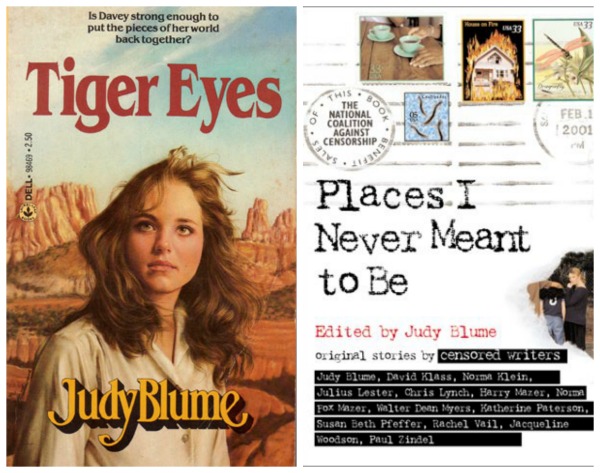Did you know that the Tiger Eyes novel is still on the banned books list, even 32 years after its publication? It currently sits at #89 on the American Library Association list of the 100 Most Frequently Challenged Books of 1990-2000 due to the story’s inclusion of teen drinking, death, and depression. Although the film has received a family seal of approval by the Dove Foundation, the book continues to be challenged in American communities. Banned Books Week is sponsored by the American Library Association to celebrate the freedom to seek and express ideas, even those some consider unorthodox or unpopular. For ideas on how to participate, visit the ALA site.
Judy has a section of her website devoted to the fight for intellectual freedom and it contains both her own experiences and some tools for combating censorship in your community. There is a toolkit developed by the National Coalition Against Censorship which includes sample letters for complaint responses, a list of the most common objections made against books and how objections must be registered, and organizations that give guidance on dealing with censorship debates in communities. She also included the foreword from a book she edited in 1999 called Places I Never Meant to Be: Original Stories from Censored Writers in which she talks about her first experience with parental censorship in her family, library censorship in her community, and later, censorship of her own writing. Of her early writing career, she says, “If someone had told me then I would become one of the most banned writers in America, I’d have laughed.”
In analyzing the word ban, as in forbid, prohibit, or restrict, Judy asks,”What do these words mean to writers and the stories they choose to tell? And what do they mean to readers and the books they choose to read?” Good questions because frequently writers self censor during the writing process. Not necessarily because they fear outside forces (publishers, libraries, parents etc), but because the act of writing can be an isolating process filled with self doubt and discouragement. Will the book sell? Will people like it? Am I good enough? Should the story be written in a certain way that will enable it to appeal to the widest audience possible? Will it reach the widest audience possible, or will it stay only as a file on my computer? All of these questions creep into the writing process even before considering the idea that an organization might find fault in the work and keep it from readers.
Scriptwriters and filmmakers who want to reach a wide audience also have to deal with these issues, first in the writing and next in the execution of bringing the work to life on screen and finally in the ratings process whereby a film is submitted to the MPAA (in the US) or other ratings bodies for a classification. While these ratings organizations do not call what they do censorship, the rating of a film does determine where or if it will be seen. Films with an NC17 rating, for example, generally have a difficult time finding theaters willing to screen them. Many smaller independent films do not apply to the ratings board (due to expense) and can find cinemas willing to screen them unrated, but it definitely curtails the ability to find a wide audience.
If you are a writer, screenwriter, novelist, poet etc, you may be interested in participating in an upcoming Twitter discussion with Judy and our film’s director, Lawrence Blume on September 29. Find out how they adapted the Tiger Eyes story for the screen, challenges they encountered and decisions they made while shooting, and how the film is being distributed. All great information if you ever dreamed of writing for the screen or turning your work into a film. You will meet other screenwriters as well as filmmakers looking to collaborate with writers.
To participate, you must have a Twitter account and follow the hashtag #scriptchat and it is best to use a chat tool such as TWUBS or Tchat.io in order to keep up with the activity. That hashtag always has conversation happening so feel free to try it out ahead of time. The chat will start at 8pm Eastern time, 5pm Pacific time. For more information and some interesting video links, go to the Scriptchat website.
See you on Twitter!
